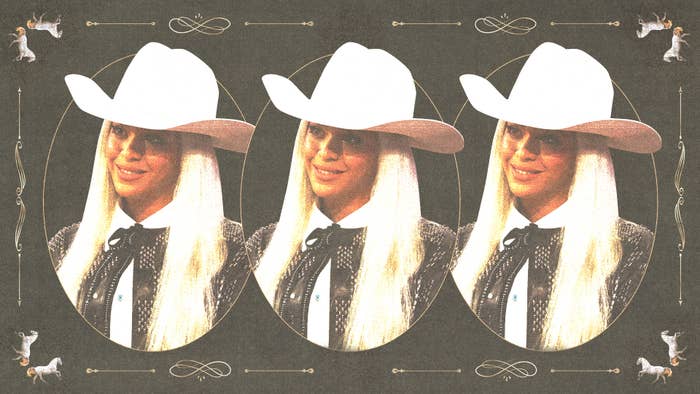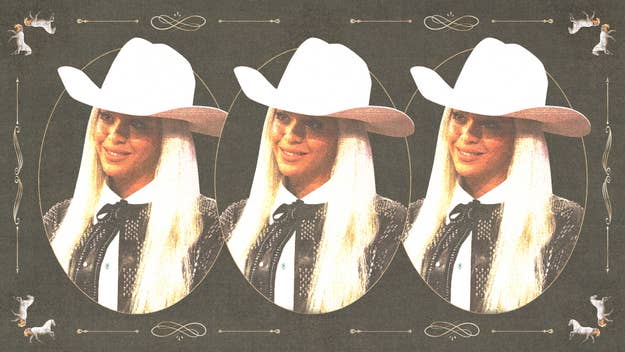
“It's so empowering to me that Beyoncé chose to do a country album,” says Tanner Adell, a 23-year-old singer-songwriter who moved to Nashville in 2021 to pursue a career in country music. “She just comes in and kicks the door down and is like, ‘We here. We've been here. This is where it came from.’”
Beyoncé’s new country album, Cowboy Carter, isn’t even out yet, but it’s already shaking up the genre. On February 13, Oklahoma’s KYKC radio station made headlines for refusing to play her new single "Texas Hold ’Em” after a listener requested the track. “We do not play Beyoncé on KYKC as we are a country music station,” Roger Harris, the station’s general manager, responded over email.
The viral incident inspired a new wave of discourse about the lack of success and airplay that Black artists—specifically Black women—have found in country music, despite the genre’s historical roots in Black culture. It wasn’t until this year, after the release of Beyoncé’s “Texas Hold 'Em,” that a Black woman artist finally topped Billboard’s Hot Country Songs chart for the first time in the history of country music, and this moment has been a long time coming.
“One of the goals I had when I arrived here 41 years ago was to see a Black woman at the top of the country chart, because I don't believe in being culturally redlined out of spaces, particularly spaces that you help create,” says Alice Randall, the first Black woman to co-write a No. 1 country hit, who has seen her songs recorded by multiple generations of artists—from Johnny Cash to Trisha Yearwood. “So many Black male artists have been in that number one spot, while Black women have been gatekept from it. Beyoncé evaded the gatekeeping,” she says.
While Beyoncé is the first Black woman to top the country charts, she isn't the first Black woman in country music. “I want people to understand that Black people have been physically present in country music since the beginning of the genre as a recorded commercially available genre,” Randall points out. But she adds, “When I showed up to write country songs, my Black and female body was not the expected body in the room. And some people pushed away from that. Some people wanted to keep the room as it had commonly been: white and male.”
“These newer artists are coming together and making profoundly important music, and it’s a reckoning that says we will be acknowledged for our past history and for our present genius.” - Alice Randall
Despite the challenges they’ve faced, Black musicians like Rhiannon Giddens, Allison Russell, and Rissi Palmer have been laying the groundwork for this current moment, one that Randall refers to as a renaissance. “These newer artists are coming together and making profoundly important music, and it’s a reckoning that says we will be acknowledged for our past history and for our present genius.” A new generation of artists like Tanner Adell, Reyna Roberts, and K. Michelle has been bubbling up in recent years, and now that Beyoncé is breaking down barriers and bringing new attention to the space, many new artists are not only feeling empowered—they're actually seeing positive effects on their own careers.
“I'm excited for her to be in this space. I love that she's breaking down barriers and she’s already having an impact after the release of her two singles,” says Reyna Roberts, a 26-year-old country music singer. “I’ve gained probably close to 400,000 new followers across all my social media platforms, and people are also streaming my album, which is a huge deal because that doesn't always translate.” This is in part thanks to a performance video of Roberts that went viral, which she attributes to Beyoncé fans researching people of color in country music shortly after the release of the two singles. She also says her debut album Bad Girl Bible, Vol. 1 has experienced a 127% increase of Spotify listeners in the past month. “We’ve been here, but I'm thankful that people are seeing us for the first time and are actually taking the time to listen to us,” she says.
While some people might argue that a mainstream pop star of Beyoncé’s merit entering the genre could occupy spots on the chart that would otherwise go to traditional country singers, many of the artists themselves believe that she’ll only bring more attention to the genre and create opportunities to highlight other artists of color. “It feels like my biggest dream has come true: that my most admired female entertainer of all time is making a country album, because I've sometimes felt invisible here,” says Adell, who released her debut album, Buckle Bunny, in 2023.
"She’s already having an impact after the release of her two singles. I’ve gained probably close to 400,000 new followers across all my social media platforms." - Reyna Roberts
A disappointing lack of representation in the genre has long existed, but there's actually a very long history of African and African-American culture in country music, including the use of the banjo, early songs adapted from slave spirituals, religious hymnals, and the works of professional Black songwriters in the South, to name a few. Then in the early 20th century, music charts separated “hillbilly music” from “race records,” directly creating a controversial reputation of country music being closed to those whom gatekeepers deem outsiders. “There’s a huge historical misconception in country music that it is a white form, or that it is a form with African-American influence on white performers, but no African-American presence,” says Randall.
While Beyoncé herself has been sidelined in the genre—in 2016, her country-inspired track “Daddy Lessons” was denied by the Recording Academy’s country music committee, making it ineligible for country Grammys—her presence in country is now elevating a conversation that has existed for decades by several Black artists in the genre. “There's a lot of, what I call, cultural redlining, in country music,” says Randall. “It’s saying Black people can be in this space, but not that space. But in fact, Black people have been cowboys. Black people have always contributed so much to country, and to the profitability of country, and to the aesthetic of country.”
Both Roberts and Adell have had their fair share of challenges while trying to gain traction in the country world as Black artists. ”People question my authenticity, why I chose this genre, and even my aesthetic,” says Roberts, who classifies her style as “country outlaw.” On the other hand, Adell says she has received pushback from the traditional country music listener demographic, but support from country music officials has helped. “I've learned that you do need allies in the country industry as a woman of color, and there are a lot of people who are willing to push you and support you and that believe in you.”
When it comes to Beyoncé, she doesn’t need recognition from country music bureaucrats to put out a successful album, as “Texas Hold 'Em” currently sits at No. 11 on Billboard's U.S. Mainstream Top 40, but perhaps country music needs Beyoncé. According to data released at this year’s Country Radio Seminar, from 2002 to 2023, songs by white artists averaged 96.5% of country radio airplay. Songs by women of color averaged .06% of the overall spins on country radio.
Bringing this conversation to the platform that Beyoncé has—that is, over 320 million followers on Instagram alone—Randall believes, is an agile way of evading some of the early gatekeeping in country. “Beyoncé has proven that a Black woman could get to the top of the country charts, and now we will see who can follow her. She's broken through that glass ceiling.”




